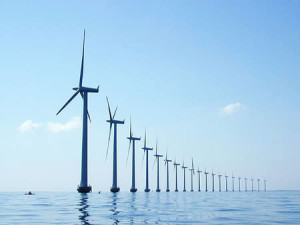With a price of 10.31 Eurocent per kWh, the new offshore wind farm, Horns Rev 3, will provide power much cheaper than other recently established offshore wind farms in Denmark and abroad

The winning tender for the wind farm Horns Rev 3 came from Vattenfall Vindkraft A/S who have agreed a price of 10.31 Eurocent per kWh. In comparison with previous price assumptions, this means that Danish consumers will experience a saving of approximately 295 million Euros over the next 11-12 years, which is the period during which the offshore wind farm will be in receipt of subsidies. Thereafter, the Horns Rev 3 facility will produce electricity at the market price and will no longer receive any form of subsidy.
The winning bid is well below the 14.07 Eurocent (15.15 Eurocent in fixed 2015-prices) which is the price being charged by Anholt Offshore Wind Farm. Horns Rev 3 is thus 32 percent cheaper than the last time Denmark built an offshore wind farm. It is believed to be the cheapest offshore wind park in Europe at the moment.
Compared to other wind farms abroad, this appears to represent a rather low price. Though a direct comparison is not possible, in the UK – the largest market for wind turbines – the cheapest parks currently being built cost 15.33 Eurocent / kWh in 2015. In addition to this the subsidies are adjusted for inflation and, in contrast to Denmark, the subsidy period is 15 years instead if the 11-12 years afforded in Denmark.
”With Horns Rev 3 Denmark is making windmill history through realising a significant reduction in the cost of establishing offshore wind farms. There is no doubt that the power from offshore wind turbines will continue to be an essential part of the green transition and contribute effectively to reducing CO2 in the atmosphere,” says Minister for Climate, Energy and Building Rasmus Helveg Petersen.
The low price is due in large part to technological developments throughout the wind turbine industry combined with a very successful tendering process. Through extensive dialogue and subsequent negotiations with the bidders, the DEA have managed to lower the price considerably. At the same time, a good, competitive environment was fostered around the windmill tendering process in which four companies were pre-qualified to participate.
“The low price is not just good for Denmark, but also for the international green transition. The general decline in prices in the market for wind power means that offshore wind power is now well on its way to becoming a viable competitive alternative to traditional fossil fuels. At the same time, we have developed an efficient procurement model which the whole of Europe can take inspiration from,” says Petersen.
The successful bid has already been approved by the signatories of the Energy Agreement 2012 and must now be adopted by parliament and signed into law. The government will present the bill on March 18 and the proposal is expected to be adopted during April with the backing of a large political majority in parliament.
Facts about Horns Rev 3:
- The winner of the tendering process is Vattenfall Vindkraft A/S.
- The agreed price is 10.31 Eurocent per. kWh.
- The construction of Horns Rev 3 is to commence as soon as possible and the park is to be completed by 1 January 2020.
- The first turbines will be able to be connected to the grid from January 1 2017 when they will be functional and ready to supply power to the grid.
- There were four companies pre-qualified to participate in the tender.
- Horns Rev 3 will result in the creation of up to 7,000 jobs over a three year period starting in 2016.
- Electricity production from the park will be enough to supply the needs of 450,000 households.
- Establishing this facility will increase the wind-sector’s share of electricity consumption in 2020 by 4.8% points from 46.2% to 51.0%.
- CO2 emissions will be reduced by 1.16 million tons.
